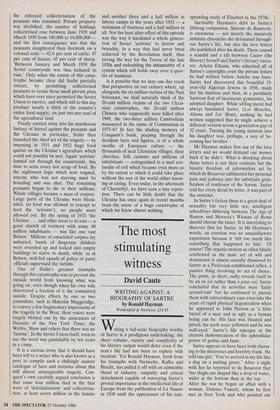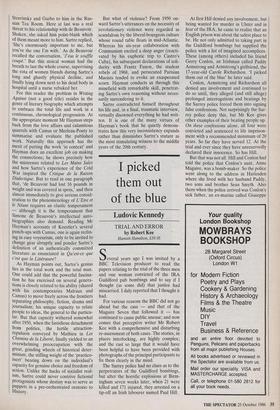The most stimulating witness
David Caute
WRITING AGAINST: A BIOGRAPHY OF SARTRE by Ronald Hayman Weidenfeld & Nicolson, .04.95 Writing a full-scale biography worthy of Sartre is a prodigious undertaking: the sheer volume, variety and complexity of his literary output would deter even if the man's life had not been so replete with incident. Yet Ronald Hayman, fresh from his triumphs with Nietzsche, Kafka and Brecht, has pulled it off with an admirable blend of industry, empathy and critical detachment capable of conveying Sartre's pivotal importance in the intellectual life of Europe from the publication of La Nausee in 1938 until the appearance of his vast, sprawling study of Flaubert in the 1970s.
Inevitably Hayman's debt to Sartre's lifelong companion, Simone de Beauvoir, is enormous — not merely the massively intimate chronicles she detonated through- out Sartre's life, but also the love letters she published after his death. These caused a scandal and a rift. between Castor (the Beaver) herself and Sartre's literary execu- tor, Arlette Elkaim, who inherited all of Sartre's copyrights even the private letters he had written before Arlette was born. Sartre had discovered this beautiful 19- year-old Algerian Jewess in 1956, made her his mistress and then, in a peculiarly Sartrean feat of incestuous gymnastics, his adopted daughter. While sibling incest had always fascinated Sartre, (Les Mouches, Altona and Les Mots), nothing he had written suggested that he might achieve a different version across a generation gap of 32 years. Turning his young mistress into his daughter was, perhaps, a way of be- coming her brother.
Mr Hayman makes free use of the love letters and we would demand our money back if he didn't. What is shocking about these letters is not their contents but the bizarre freedom of information act by which de Beauvoir sublimated her personal pain and jealousy into the substitute grati- fication of confessor of the harem. Sartre told her every detail by letter, it was part of the contract.
In Sartre's fiction there is a great deal of sexuality but very little sex; intelligent schoolboys dithering between The Age of Reason and Moravia's Woman of Rome should choose the latter. It is interesting to discover that for Sartre, in Mr Hayman's words, an erection was an unsatisfactory experience because it 'felt too much like something that happened to him'. Of course! The organic motion so often falsely celebrated as the male act of will and dominance is almost casually dismissed by Sartre as a Pavlovian conditioned reflex, a passive thing involving no act of choice. The penis, in short, sadly reveals itself to be an en soi rather than a pour soi; Sartre concluded that its activities were 'fairly second-rate' but he continued to pursue them with extraordinary ease even into the years of rapid physical degeneration when he appeared to John Huston as 'a little barrel of a man and as ugly as a human being can be. His face was bloated and pitted, his teeth were yellowed and he was wall-eyed.' Sartre's life emerges as the clearest demonstration of the aphrodisiac power of genius and fame.
Sartre appears to have been both charm- ing to his mistresses and horribly frank. He told one girl, 'You've arrived in my life like a dog on a putting green.' After a night with her he reported to de Beauvoir that 'her thighs are shaped like a drop of water, wider at the bottom than at the top . . After the war he began an affair with a woman, Dolores Vanetti, whom he first met in New York and who pointed out Stravinsky and Garbo to him in the Rus- sian Tea Room. Here at last was a real threat to his relationship with de Beauvoir. Shaken, she asked him point-blank which of them meant more to him. Sartre replied, 'She's enormously important to me, but you're the one I'm with.' As de Beauvoir recalled the conversation, Teus le souffle coupe.' But this stoical woman had the breath to last the whole course, supervising the rota of women friends during Sartre's long and ghastly physical decline, and finally lying down next to his dead body in hospital until a nurse rebuked her.
For this reader the problem in Writing Against (not a good title) resides in the genre of literary biography which attempts to embrace the total life and work in a continuous, chronological progression. At the appropriate moment Mr Hayman steps back from the love affairs and Calamitous quarrels with Camus or Merleau-Ponty to summarise and evaluate the published work. Naturally this approach has the merit of putting the work 'in context' and Hayman does an excellent job on making the connections; he shows precisely how the mistresses related to Les Mains Sales and how Sartre's experience of the Cold War inspired the Critique de la Raison Dialectique. But to read in one paragraph that, 'de Beauvoir had lost 16 pounds in weight and was covered in spots,' and then almost immediately to give serious consid- eration to the phenomenology of L'Etre et le Neant requires an elastic temperament — although it is the temperament that Simone de Beauvoir's intellectual auto- biographies also demand. Reading Mr Hayman's accounts of Koestler's several punch-ups with Camus, one is again reclin- ing in easy voyeurism, only to be invited to change gear abruptly and ponder Sartre's definition of an authentically committed literature as enunciated in Qu'est-ce que c'est que la Litterature?
As Hayman points out, Sartre's genius lies in the total work and the total man. One could add that the powerful fascina- tion he has exercised on several genera- tions is closely related to his ability (shared With his contemporaries Malraux and Camus) to move freely across the frontiers separating philosophy, fiction, drama and Journalism; his unique capacity to relate People to ideas, the general to the particu- lar. But that capacity withered somewhat after 1950, when the fastidious detachment from politics, the fertile attraction- repulsion conveyed by Mathieu in Les Chemins de la Liberte, finally yielded to an overwhelming preoccupation with the great, grinding wheels of historical deter- minism, the stifling weight of the `practico- inert' bearing down on the individual's capacity for genuine choice and freedom of action. Unlike the hacks of socialist real- ism, Sartre could never contrive fictional Protagonists whose destiny was to serve as Puppets in a pre-orchestrated oratorio to History. But what of violence? From 1950 on- ward Sartre's utterances on the necessity of revolutionary violence were regarded as scandalous by the liberal-bourgeois culture whose round table floats in mid-Atlantic. Whereas his six-year collaboration with Communism excited a deep anger (reacti- vated by his euphoric trip to Castro's Cuba), his subsequent declarations of soli- darity with Frantz Fanon, the student rebels of 1968, and persecuted Parisian Maoists tended to evoke an exasperated scorn. Hayman conducts us through this minefield with remarkable skill, penetrat- ing Sartre's own reasoning without neces- sarily surrendering to it.
Sartre contradicted himself throughout his life and, in a final, traumatic interview, virtually disowned everything he had writ- ten. It is one of the many virtues of Hayman's book that he quietly demons- trates how this very inconsistency expands rather than diminishes Sartre's stature as the most stimulating witness to the middle years of the 20th century.



























































 Previous page
Previous page